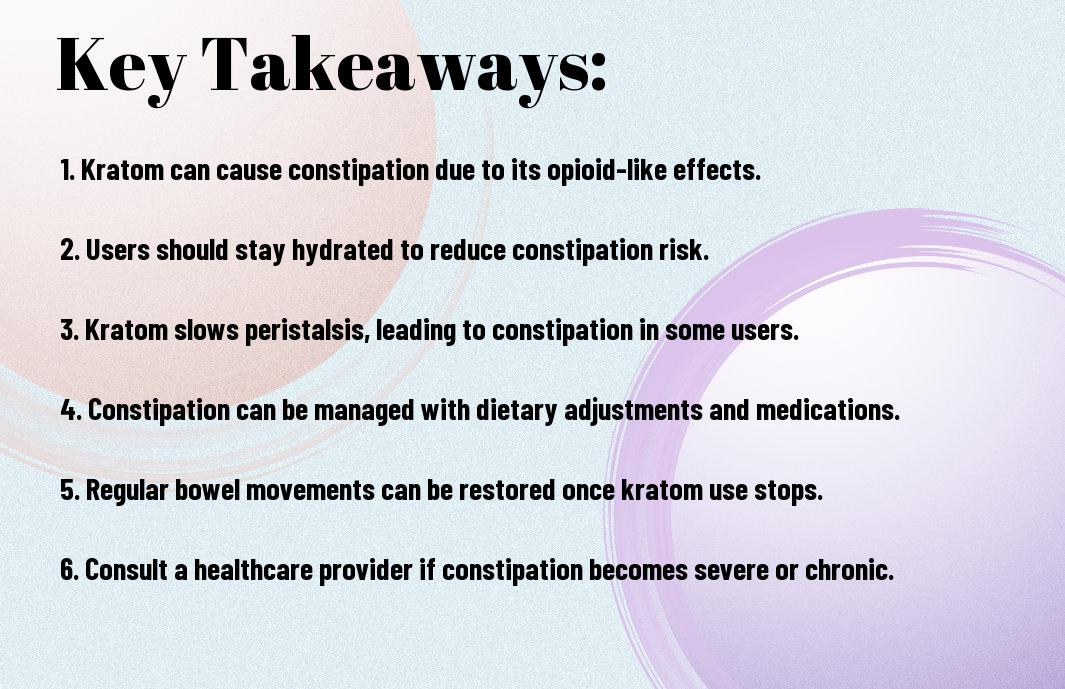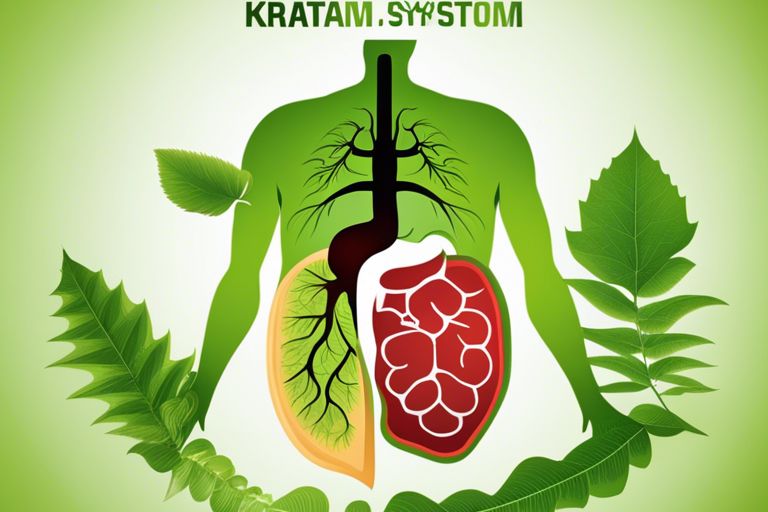Adults who consume kratom may be curious about its potential side effects, including the common concern of constipation. Exploring the impact of kratom on gastrointestinal function is crucial for informed use. Let’s explore into the research to uncover the relationship between kratom and constipation in adults and gain a better understanding of this issue.
Key Takeaways:
- Kratom can cause constipation: Consuming kratom, especially in high doses, can lead to constipation in adults.
- Mechanism of action: Kratom contains compounds that affect the digestive system, slowing down bowel movements and potentially causing constipation.
- Preventive measures: Staying hydrated, maintaining a balanced diet high in fiber, and regulating kratom dosage can help prevent or alleviate constipation caused by kratom use in adults.


What is Kratom?
A study in Frontiers in Pharmacology titled “Examining the paradoxical effects of kratom: a narrative review” explores into the complexities of kratom, a plant native to Southeast Asia that has gained popularity for its medicinal properties. Kratom, scientifically known as Mitragyna speciosa, belongs to the coffee family and has been used for centuries in traditional medicine practices.
Origins and History
One fascinating aspect of kratom is its rich history dating back to indigenous communities in Southeast Asia, where it was traditionally consumed for its stimulant and pain-relieving effects. The plant has played a significant role in cultural and religious ceremonies, where it was believed to enhance vitality and productivity.
Chemical Composition
With over 40 compounds identified in kratom leaves, the plant’s chemical composition is complex and diverse. The two most important alkaloids found in kratom are mitragynine and 7-hydroxymitragynine, which interact with opioid receptors in the brain to produce positive effects like pain relief and mood enhancement. While kratom’s alkaloids can offer benefits, they also pose potential risks when consumed in large quantities or in combination with other substances.
The Effects of Kratom on the Body
Little research has been conducted on the effects of kratom, and much of what we know comes from user experiences. One of the reasons kratom is known and used is its opioid-like properties, which can provide pain relief and a sense of euphoria. Kratom interacts with opioid receptors in the brain, similar to how opioids work, but without the dangerous side effects often associated with traditional opioids.
Opioid-Like Properties
Opioid-like properties of kratom make it appealing to individuals seeking pain relief or looking to manage opioid withdrawal symptoms. However, it’s important to note that kratom can still lead to dependence and addiction if used in large doses or for extended periods. It’s crucial to use kratom responsibly and in moderation to avoid potential adverse effects.
Stimulation and Sedation
Many users report that kratom can have both stimulating and sedative effects, depending on the strain and dosage used. Some strains are known for their energizing properties, while others are more calming and relaxing. It is crucial to start with a low dose and observe how your body reacts to find the right balance between stimulation and sedation. Overuse of kratom can lead to tolerance, where higher doses are needed to achieve the desired effects, increasing the risk of dependence.
To fully understand the effects of kratom on the body, it is important to consider individual differences, such as metabolism, tolerance, and sensitivity to substances. Being aware of these factors can help individuals make informed decisions about their kratom use and minimize the risk of adverse effects. Consulting with a healthcare provider before starting kratom can also provide valuable insights and guidance on safe practices.
Constipation: A Common Side Effect?
After reading about Kratom: Dangers, Side Effects, and Overdose, you may wonder about the prevalence of constipation in Kratom users. It is a common side effect reported by individuals who use Kratom for various purposes.
Prevalence of Constipation in Kratom Users
Common in Kratom users, constipation can occur due to the way Kratom interacts with the digestive system. Kratom alkaloids can slow down peristalsis, the muscle contractions that move food through the digestive tract. This sluggish movement of food can result in constipation symptoms for individuals who consume Kratom regularly.
Possible Causes of Constipation
An imbalance in neurotransmitters could contribute to constipation in Kratom users. The alkaloids present in Kratom may affect the levels of neurotransmitters responsible for regulating digestive functions. This disruption can lead to constipation as a side effect of Kratom use.
For instance, an increase in norepinephrine levels caused by Kratom could impact the gut-brain connection, influencing the digestive process and potentially resulting in constipation. It’s vital for individuals using Kratom to be aware of the potential side effects like constipation and take appropriate measures to address them.
The Gut-Brain Connection
Despite the common belief that gut health and brain function are unrelated, research has shown a strong connection between the two. The gut-brain axis plays a vital role in regulating various bodily functions, including digestion, mood, and even immune response. This connection highlights the importance of maintaining a healthy gut for overall well-being.
How Kratom Affects Gut Health
One of the ways in which kratom may impact gut health is through its interaction with the digestive system. Kratom contains alkaloids that can affect the smooth muscles in the intestines, potentially leading to constipation in some individuals. Constipation is a common side effect reported by kratom users, which may be linked to its impact on gut motility.
The Role of Gut Bacteria
Kratom consumption may also influence the balance of gut bacteria, known as the gut microbiota. This intricate ecosystem of microorganisms plays a crucial role in various aspects of health, including digestion, immune function, and even mood regulation. Imbalances in the gut microbiota can lead to various health issues, including gastrointestinal problems and immune disorders.
Other Factors Contributing to Constipation
Once again, it is crucial to consider that several factors can contribute to constipation in adults. While kratom use may play a role in bowel irregularity, here are some other key factors to keep in mind:
Diet and Lifestyle
On the one hand, diet and lifestyle choices can significantly impact bowel movements. A diet low in fiber and hydration can lead to constipation. Lack of physical activity and sedentary habits also contribute to digestive issues. It is crucial to maintain a balanced diet rich in fiber, drink plenty of water, and engage in regular exercise to promote healthy digestion and prevent constipation.
Medication Interactions
Contributing to constipation can be various medications commonly used by adults for different health conditions. Some medications, such as opioids and certain antidepressants, are known to have constipation as a side effect. This interaction can exacerbate constipation when combined with kratom use. It is crucial to consult with a healthcare provider to discuss potential interactions between medications and kratom to avoid complications.
Interactions between medications and kratom can have serious consequences if not carefully managed. It is crucial to monitor your symptoms closely and communicate openly with your healthcare provider about any concerns you may have. Though kratom may be a contributing factor to constipation, it is crucial to address all potential causes to maintain optimal digestive health.
Managing Constipation While Taking Kratom
Your digestive system may need some additional support while taking kratom to prevent constipation. Making dietary changes can help regulate your bowel movements and alleviate constipation.
Dietary Changes
Changes in your diet can play a significant role in managing constipation while using kratom. Ensure you are consuming an adequate amount of fiber-rich foods such as whole grains, fruits, and vegetables. Hydration is also crucial, so drink plenty of water throughout the day to keep your digestive system functioning properly and prevent dehydration, which can exacerbate constipation.
Supplemental Support
With the potential for constipation while taking kratom, you may consider supplemental support to help alleviate symptoms. Adding a fiber supplement or a gentle laxative to your routine can help promote regular bowel movements and prevent constipation. However, it is important to consult with a healthcare professional before starting any new supplements to ensure they are safe for you to use in conjunction with kratom.
Kratom can be a helpful tool for managing various conditions, but it is necessary to be mindful of potential side effects such as constipation. Taking proactive steps to support your digestive system can help mitigate these effects and allow you to continue benefiting from kratom’s positive properties.
Summing up
Drawing together the information presented in this analysis, it is clear that kratom does have the potential to cause constipation in adults. While more research is needed to fully understand the mechanisms behind this side effect, it is important for individuals considering kratom use to be aware of the potential gastrointestinal effects. It’s always recommended to consult with a healthcare professional before using any new substance, including kratom, to ensure that it is safe and appropriate for individual health needs.
How Does Narcan Interact with Kratom and Its Potential Side Effects?
Narcan and kratom interaction can be dangerous as both substances can impact the central nervous system and respiratory function. Narcan, an opioid antagonist, may lead to withdrawal symptoms when used with kratom, a plant with opioid-like effects. Side effects can include dizziness, nausea, vomiting, and respiratory depression.
FAQ
Q: Does using kratom cause constipation in adults?
A: Yes, kratom can cause constipation in adults. Kratom is known to slow down the digestive system, leading to constipation as a possible side effect.
Q: How does kratom lead to constipation in adults?
A: Kratom contains alkaloids that bind to the opioid receptors in the digestive system, which can slow down bowel movements and result in constipation.
Q: What are some strategies to prevent or relieve constipation caused by kratom use?
A: To prevent or relieve constipation when using kratom, it is important to stay hydrated, eat a diet high in fiber, and consider taking natural laxatives or stool softeners.
Q: Are there differences in susceptibility to constipation from kratom among adults?
A: Yes, individual differences play a role in how adults respond to kratom, including the likelihood of experiencing constipation. Factors such as dosage, frequency of use, and overall health can influence susceptibility.
Q: When should adults seek medical advice regarding constipation related to kratom use?
A: Adults using kratom who experience severe or prolonged constipation should seek medical advice. It is important to address persistent constipation to prevent any complications or underlying health issues.










